How to Bypass AI Detection
- January 3, 2025
- 8 mins read
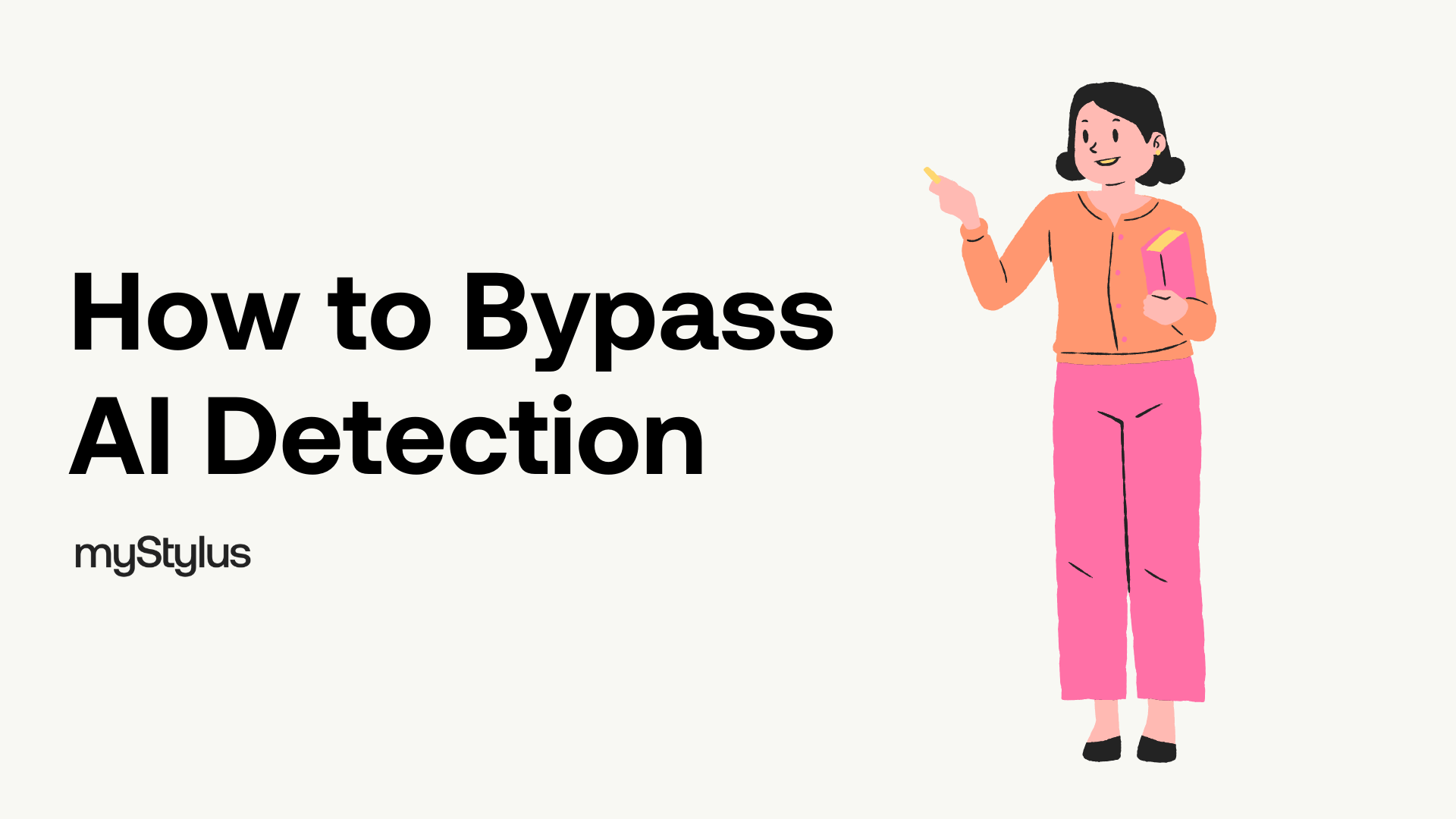
In the last few years, AI has begun to infiltrate virtually every aspect of modern life. Many individuals are tremendously excited about what this new type of technology can do, and rightly so. There are several uses and ways in which it may simplify our life. However, as this tech becomes more prevalent, tools have started appearing that can figure out whether you’re using it for assistance with various projects. That is why it has become necessary to learn ways to bypass AI text detection. If you’re intending to use it for academia, in particular, is when you must exercise caution.
How to Get Past AI Detector Methods that Are Popular Today
To get by the detection methods that dominate today’s market, relying on MyStylus rather than ChatGPT is your best bet. That is because MyStylus uses a method of subtle pattern avoidance that detector programs are not able to notice. You’re essentially employing one version of technology to fight off another.
Using Active Voice Gets Better Results
Bypassing tools professors and other individuals in prominent positions use to identify AI-created content is challenging. It’s not impossible, though. One way you can often bypass AI content detection is by using active voice more and passive voice less. Why?
- It’s the way we structure our sentences when speaking
- It’s a way to add a sense of immediacy to what someone is saying
- It’s something that most AI-infused writing helpers do not use at the moment
If you look at what is being created by many of the top artificial intelligence writing aids right now, you’ll quickly notice a lot of passive voice. This happens because the writing is meant to sound more scholarly.
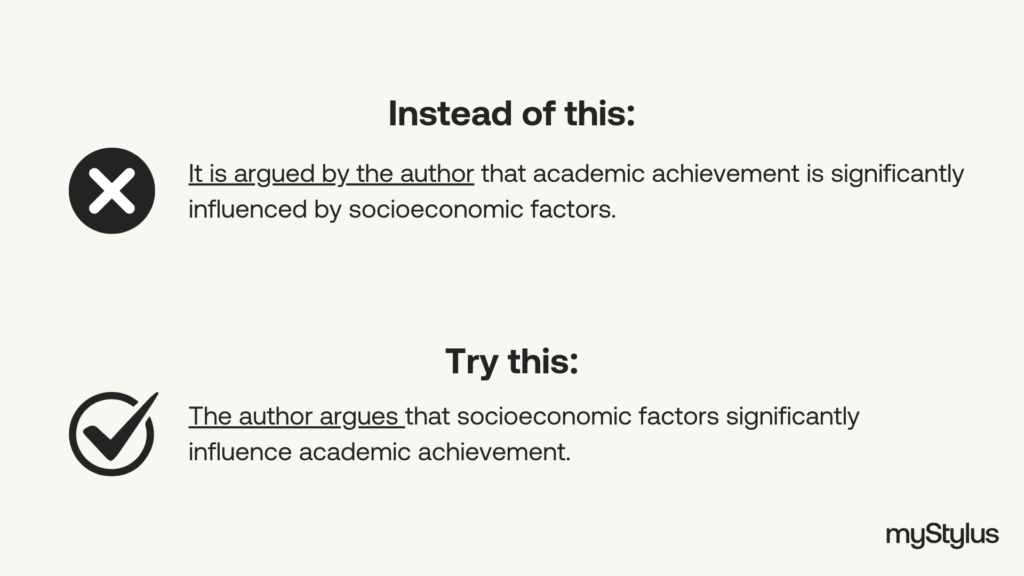
Humans don’t speak or write that way as much, though. It follows that having an AI writing tool that uses mainly active voice can fool even the most sophisticated detectors.
Paraphrasing Can Help You as Well
Let’s say you want your use of a helper to remain undetectable when you’re writing a paper or doing some other kind of homework. If so, you can let the program write your paper, but then you might do some slight revisions to disguise your work. In other words, you can paraphrase.
When you do a rewrite to bypass AI detection, it works because:
- You’re throwing off the algorithms these detector tools use
- You’re adding introductory words that don’t sound as though a non-human entity wrote them
- You’re changing the sentence structures that are most likely to get flagged
You don’t necessarily have to change sentences around manually, though. There are also paraphrasing tools you can use that work just as well. You don’t have to remove AI content to avoid detection. You can simply tweak it to throw off the algorithms you’re combating.
Simplicity is Your Ally as Well
One more thing you can do to keep your work from being flagged as AI-written is to simplify your sentence structures. A good AI detection bypass is to write short, clipped sentences that are declarative. It’s the exact opposite of what most non-human writing programs will create for you.
Remember that these tools were taught using academic language models if they were intended for use in academia. That almost always means you’re getting long, complex sentences.
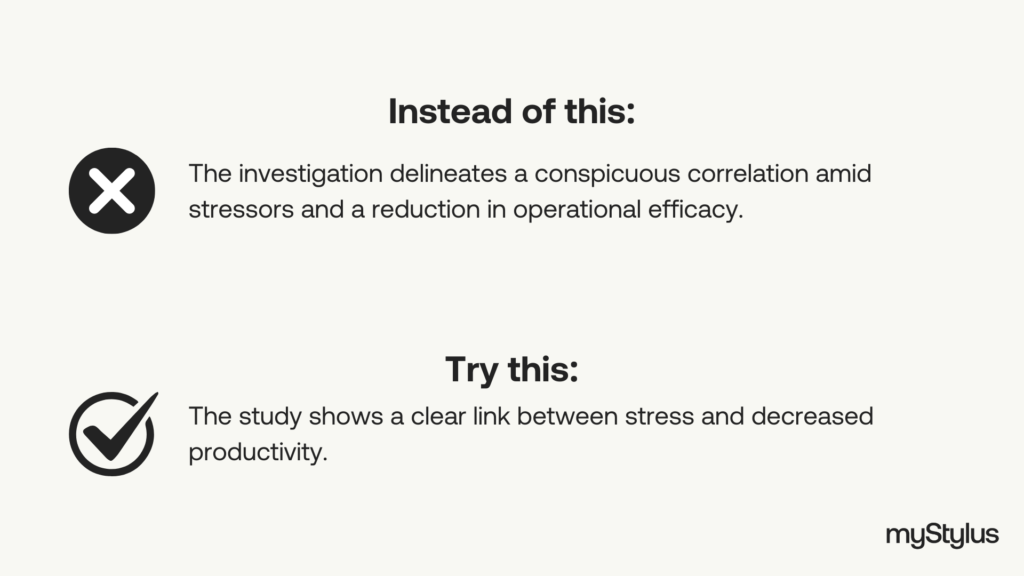
Any of the detection programs you’re trying to fool will be looking for this style of writing. Switching things up on them makes it much more likely your work will come back as being written by a human.
Get Ready to Use All of Your Synonyms
Synonyms can be another secret weapon in your arsenal if you’re looking to beat AI detectors that might flag an assignment you turn in. Generators often use the same words over and over within the context of writing assignments. Once you give one a writing prompt, it will latch onto certain terms and repeat them without variation.
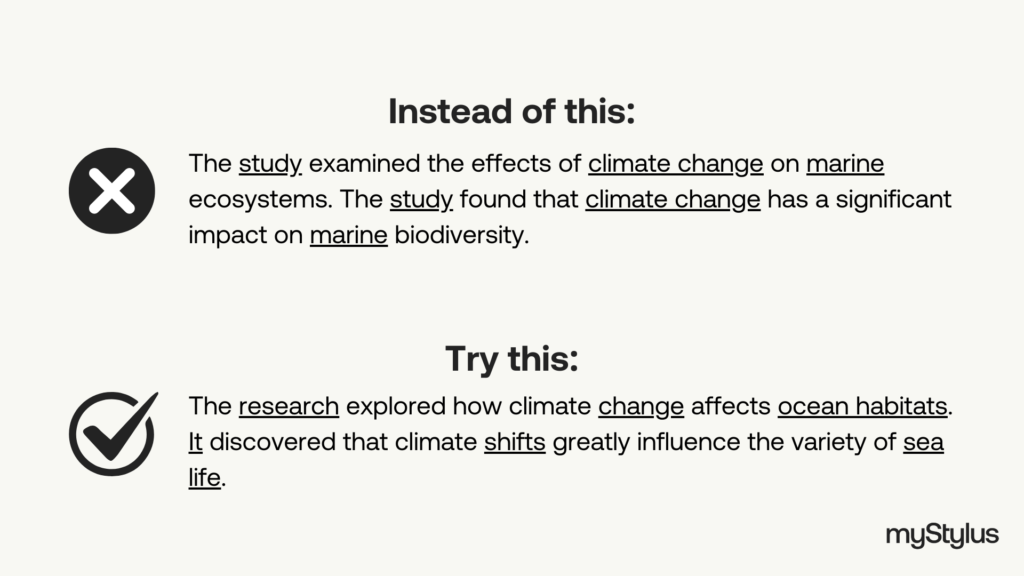
To make a written assignment appear more like a human wrote it, mixing in a few synonyms for keywords in your paper becomes crucial. If you do this liberally throughout an essay, that’s another way you can throw the programs to detect AI writing that are being used against you off the scent. Counteracting repetition with a little variation can take you a long way as you start to learn more about these precautionary measures you should take.
Your Personal Experiences Become Exceedingly Beneficial
To pass AI detection, there’s another technique you should definitely consider. The creation of AI-generated text is often formulaic. When you read it, you can normally identify the finished product because of things like sentence structure, grammar, and syntax. What’s often lacking is the personal touch that marks such homework assignments or essays as being written by humans.
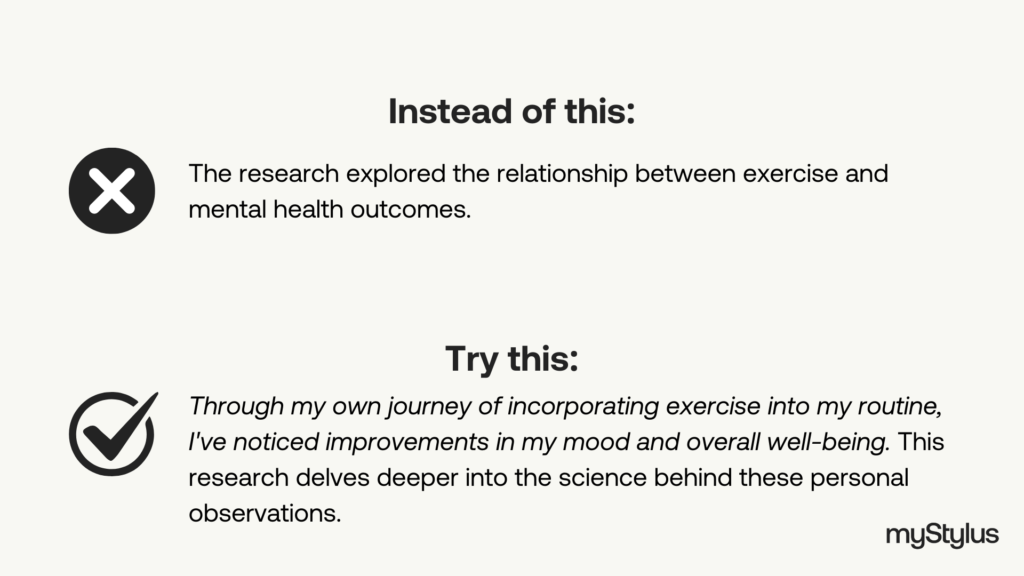
Injecting your personal experiences into the narrative is another way you can throw off the tools that are attempting to catch you. Personal experiences spice up bland writing. They’re a way you can make the essay or whatever other kind of deliverable you’re giving to your instructor distinctly your own.
Humanizer Tools Have Arrived
You should also know about the proliferation of so-called “humanizer” tools if you’re concerned about an assignment you’re turning in getting flagged as AI-created. This is a form of AI bypass tool that uses some of the techniques we’ve mentioned to throw off detection programs. These humanizing tools:
- Switch up long and short sentences
- Add personalized experiences to make the content seem more as though a human wrote it
- Use synonyms to add variety to the copy
At last, we tested the methods we mentioned, so you could see if they’ll prove themselves effective. We generated with ChatGPT a few paragraphs, then edited them according to our guide and ran an AI detection tool. You can see the results on the picture below. It’s good that you won’t have to do it with MyStylus, right?
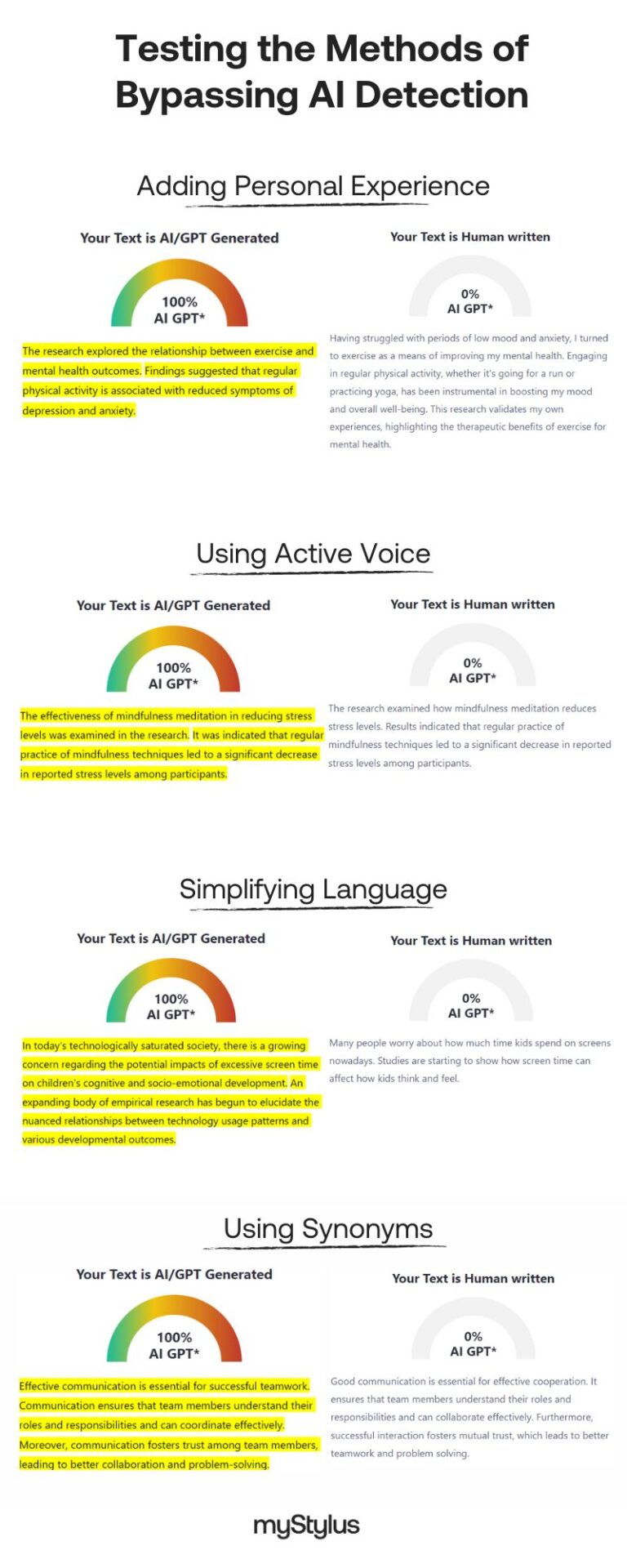
How to Give the Right Sorts of Prompts
Let’s envision a scenario where you’re trying to continue your education at an accredited institution of higher learning. You’ve been tasked with delivering a paper or homework assignment that is going to be worth quite a bit of your final grade. However, you’re extremely busy with family tasks, your job, or other classes. You decide to use one of the AI-infused content generators on the market.
There are ways you can give prompts to a generative program that will ensure you never have to do a rewrite to bypass AI detection. What you mainly want to do is the following:
- Say that you want the paper written with as much paraphrasing as possible
- Make the prompts as detailed and descriptive as you can
- Share a personal anecdote and ask that it be used in the essay or paper
- Insist on the avoidance of repeated phrases or keywords
This is how you can communicate what you want from a deliverable in a way that incorporates much of what we’ve been talking about. You won’t even need to use an AI detection bypass tool if you can learn to give prompts that incorporate all of these techniques.
A More In-Depth Look at Why You May Have to Bypass AI Detection
As you start to comprehend more about how this new and innovative kind of tool is being used, it becomes obvious why you may need to bypass AI detector methods that have risen to prominence in recent years. Students, particularly at the collegiate level, have taken to utilizing ChatGPT and similar intuitive models to help them with their research papers and other homework assignments.
The 74 reports that, “as students increasingly turn to generative AI for schoolwork, educators grow more wary of their pupils’ academic integrity.” Accordingly, they are failing students who they believe are utilizing them. That’s why you need to learn ways to bypass detection and learn how to write good prompts if you’re going to continue using artificial intelligence for help with your school assignments.
Luckily, MyStylus AI is here now, and it can be the answer if you’re worried about a teacher detecting your use of a non-human writing aid. This is tech that can easily evade even the most advanced of detectors.
How Exactly Does an AI Content Detector Work?
Before you start looking closely at tools which get around AI detectors, you should know how this kind of tech is structured and how it works. Keep the following points in mind:
- The technology works by trying to predict patterns
- As of this point, it is not yet an exact science
- The inability to accurately assess what’s AI-written and what isn’t is causing problems in several niches and industries. Open AI team conducted a study on AI detectors, and they “found that it labeled human-written text like Shakespeare and the Declaration of Independence as AI-generated.”
In theory, content that was written using assistance from artificial intelligence can be noted by predictive pattern recognition. Each form of detector, most of which are basically the same, is infused with an algorithm. It’s that algorithm that you’re attempting to fool if you’re going to continue using non-human writing helpers for academic assignments.
If you need an AI bypass tool, MyStylus uses GPT-4. It’s perfect for counteracting the predictive pattern technology most detection devices rely on.
The Evolution of AI Detection Technology
As AI tools have improved, so have programs designed to detect when something is written by AI.
How AI Detection Started
At first, AI detection tools were pretty simple. They tried to spot AI-written text by looking for:
- Repeated words or phrases that sounded unnatural.
- Sentences that didn’t flow the way humans write.
- Similarities to other AI-generated writing.
These early tools sometimes worked, but they also made mistakes. Sometimes, they thought human writing was AI-generated, and sometimes they didn’t catch AI-written text at all.
Improving AI Detection with Predictive Language Models
As AI writing tools like ChatGPT became more advanced, AI detectors had to get better, too. Newer AI detection tools started using predictive language models. These tools:
- Check if a sentence follows natural human writing patterns.
- Use math to figure out if a passage sounds like AI or a person.
- Compare writing to huge collections of human and AI-written text.
These updates made AI detection tools much more accurate and harder to trick.
Using Machine Learning to Catch AI Writing
To stay ahead, AI detectors started using machine learning and deep learning, which made them even smarter. These new tools can:
- Recognize small details in writing that AI often misses.
- Understand meaning and not just words.
- Keep learning and improving as new AI writing tools come out.
Because of this, AI detectors have become more precise, and they make fewer mistakes than before.
Detecting AI Writing Across Different Platforms
Modern AI detection tools can now work across different types of writing. They can:
- Analyze text from different AI models, like ChatGPT, Bard, and Claude.
- Detect AI writing in different languages and writing styles.
- Work with various formats, like essays, reports, and social media posts.
This makes AI detection more powerful and harder to get around.
AI Detection with Human Review
Some AI detection tools now combine AI with human review. This means:
- AI finds text that might be AI-generated.
- Humans double-check to make sure it’s correct.
- This reduces mistakes and makes AI detection more reliable.
Having humans involved helps ensure that real human writing isn’t accidentally flagged as AI-generated.
Know About AI Detection Tool Enhancements
Even as you’re constantly looking for ways to get away with an AI detector bypass as a student, there will be new tech coming out that is intended to thwart you.
One thing that some of the latest versions of this tech can do is identify Unicode characters. These are numeric character codes that are embedded in some forms of content that are AI-created.
Others can use cross-platform compatibility. They’ll work across many different devices and systems. Some are extremely customizable. The user can make them laser focused to analyze content based on that person’s needs.
Some boast the ability of detecting AI-written content across Claude, Bard, GPT-3, and many others. Others can analyze content written in dozens of different languages.
All of this is proof positive that if you feel you don’t need to try and fool the AI-detecting programs that are on the market right now, you’re mistaken.
AI-Generated Content Quality
You should also realize that every time a new method comes out of trying to identify AI-generated content, there are just as many ways to potentially counteract it. To get around AI detection, using the Stylus AI tool gives you the best chance of getting a professor to accept your work as being 100% original.
It uses all of the techniques we’ve mentioned. It mixes up short and long sentences. It uses many synonyms rather than repeating the same words and phrases over and over. It adds anecdotes that make the content sound more human-written. No other AI writer on the market today can equal what it produces.
Conclusion
We’re living in a moment in history when artificially created term papers and homework assignments are commonplace.
If you’re going to attempt to utilize one of these programs, make sure it’s Stylus AI. It’s the most advanced and comprehensive model available now, and many students have come to rely on it.
Resources
- How can educators respond to students presenting AI-generated content as their own? | OpenAI Help Center. (n.d.). https://help.openai.com/en/articles/8313351-how-can-educators-respond-to-students-presenting-ai-generated-content-as-their-own
- Alimardani, A., & Jane, E. A. (n.d.). We pitted ChatGPT against tools for detecting AI-written text, and the results are troubling. The Conversation. https://theconversation.com/we-pitted-chatgpt-against-tools-for-detecting-ai-written-text-and-the-results-are-troubling-199774
- Keierleber, M. (2024, April 2). ‘Distrust, Detection & Discipline:’ New Data Reveals Teachers’ ChatGPT Crackdown. The 74. https://www.the74million.org/article/distrust-detection-discipline-new-data-reveals-teachers-chatgpt-crackdown/
Written by Laurie Smith
FAQ
-
Can You Learn How to Get Around AI Detector Tools?
You can absolutely learn how to get around these kinds of programs. It’s not easy, but we’ve talked about some ways you can do it. If you know how AI-written content looks and sounds, changing a text so it doesn’t match that becomes vital if you want a passing grade. -
Is AI Detection Tool Bypass Legal?
Yes, it’s legal to get around the usage of these kinds of tools. There’s no law that says you can’t turn in AI-created essays and other schoolwork, which is why so many individuals pursuing advanced degrees are doing it right now. -
Is It Difficult to Bypass AI Detection Tool Methods?
It can be quite difficult. You need to keep up with the latest advancements in this technology. They’re coming seemingly every day, but remember this: with every new method of identifying AI-created content, there’s another way to counteract it as well. -
Can Anyone Learn How to Bypass AI Detection?
Yes, this is something that virtually anyone can learn with the help of ai detection bypass tools. You don’t have to be a genius to figure out what kind of strategies AI-detecting programs are using, and there are myriad ways of tipping the scales in your favor to avoid being caught.